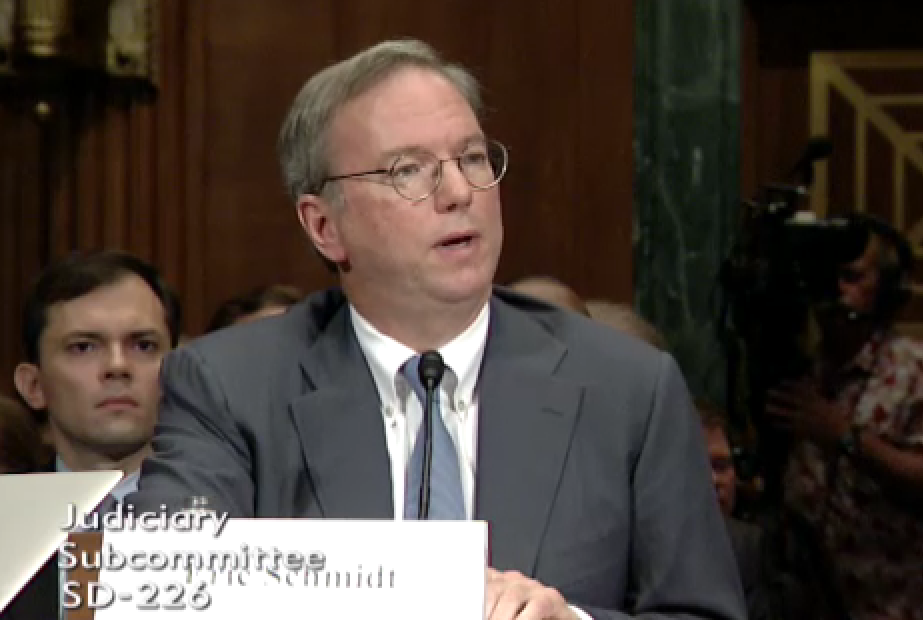Google's Schmidt, Senators bicker over whether links were 'cooked'

Google executive chairman Eric Schmidt and a panel of senators agreed to disagree over whether the search giant favors its own properties over competitors.
Schmidt's testimony before the Senate Judiciary Subcommittee on Antitrust boiled down to trust us. Schmidt referenced Microsoft as a company that looked unbeatable 20 years ago, but ultimately missed the curve on mobile and other trends.
The message: "The Internet is the ultimate level playing field," said Schmidt, who portrayed Google as a company working to put consumers first over profits. "We focus on loyalty not lock-in."
In other words, Schmidt's testimony boiled down to trust us.
The early fireworks appeared when Sen. Michael S. Lee (R-UT) produced data that showed that Google's owned and operated properties often were among the top links. Schmidt said that Google aimed to give answers quickly and sometimes engineering dictated that a stock quote from Google Finance was faster than the "10 links answer." That rationale from Schmidt also applied to Maps and other areas.
Lee asked Schmidt whether Google products and services are subject to the same search ranking algorithm process as all organic search results. He was intimating that Google favors its own "secondary" product in search result. Schmidt explained that if Google knows the answer to a query, "it is better for the consumer for us to answer the question," and use its our data resources. "I am not aware of any boosts or bias" in the search results, Schmidt said.
Also: CNET: Google "rigs" search, results rivals tell senators
Lee gave an example of a product search where the result appears to include a result from Google consistently high up on the first page of results. "You've cooked it so you are always third," Lee charged.
"Senator, I can assure you we have not cooked anything," Schmidt calmly said.
Google's overall message is that the company is different because it operates in an open Internet where consumers are a click away from another service. Schmidt believes that the huge base of Google users provides a kind of governance that makes the company trustworthy "The ultimate correction against any mistake is how consumers behave," Schmidt said. "People have choices…our customers want quick and accurate answers, and the way we correct ourselves is if they switch."
Schmidt's point on users switching leading to how Google treats its search results seems to assume that its hundreds of millions of users are sophisticated enough to understand the intricacies of search results and any favoritism Google may be lending to its own products and service.
However, Schmidt is right that Google is compelled to make it easy for searchers to find good answers, but the product search above shows that it gives its own product database a more favorable treatment, if not rank.
Sen. Herb Kohl (D-Wisc.) said that an investigation of Google's business practices had to boil down to trust but verify. Schmidt noted that he could go with that. "I agree with trust, but verify," said Schmidt. "We live in great fear that consumers will switch."
Other highlights from the hearing:
- Schmidt opened up his testimony with a reference to Microsoft and how it looked unbeatable 20 years ago.
- Sen. Al Franken (D-MN) said he was shocked by some of generalizations in Schmidt's answers. "If the chairman doesn't know this who does?" said Franken, who had a big beef with the lack of specifics from Schmidt.
- Franken also noted that he found Yelp's testimony about Google's business practices troubling.
- Charles Schumer's (D-NY) 7-minute questioning period equated to a monologue about technology in his state and an appeal for Google to expand there.
CBS News' Dan Farber contributed to this report.
Related: Google goes to Capitol Hill: Messaging wars next
- How evil is Google? Your Senators want to know.
- CBS News: Schmidt's rope-a-dope: One for the record books
- CNET: Schmidt's written testimony
- CNET: Google’s Schmidt faces Senate grilling
- CBS News: Washington gets ready to ask Google if it’s evil
- Google: A Guide to the Senate Judiciary Hearing
- Yelp: Seeking a Level Playing Field…
